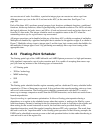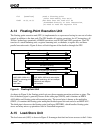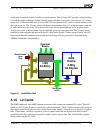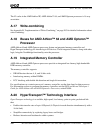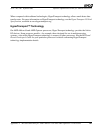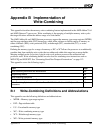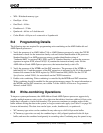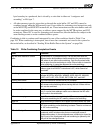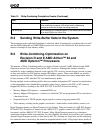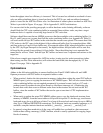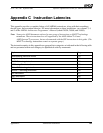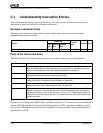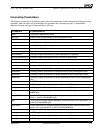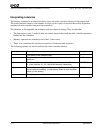
Appendix B Implementation of Write-Combining 265
Software Optimization Guide for AMD64 Processors
25112 Rev. 3.06 September 2005
byte boundary in a quadword, but is closed by a write that is either not “contiguous and
ascending” or fills byte 7.
• All other memory types for stores that go through the write buffer (UC and WP) cannot be
combined except when the WB memory type is over-ridden for streaming store instructions such
as the MOVNTQ and MOVNTI instructions, etc. These instructions use the write buffers and will
be write-combined in the same way as address spaces mapped by the MTTR registers and PAT
extensions. When WC is used for streaming store instructions, then the buffers are subject to the
same flushing events as write-combined address spaces.
Combining is able to continue until interrupted by one of the conditions listed in Table 12 on
page 265. When combining is interrupted, one or more bus commands are issued to the system for
that write buffer, as described in “Sending Write-Buffer Data to the System” on page 266.
Table 12. Write-Combining Completion Events
Event Comment
Non-WB write outside of current
buffer
(On revisions A–C processors only) The first non-WB write to a
different cache block address closes combining for previous writes.
WB writes do not affect write-combining. Only one line-sized buffer
can be open for write-combining at a time. Once a buffer is closed for
write-combining, it cannot be reopened for write-combining.
I/O Read or Write Any IN/INS or OUT/OUTS instruction closes combining. The implied
memory type for all IN/OUT instructions is UC, which cannot be
combined.
Serializing instructions Any serializing instruction closes combining. These instructions
include: MOVCRx, MOVDRx, WRMSR, INVD, INVLPG, WBINVD,
LGDT, LLDT, LIDT, LTR, CPUID, IRET, RSM, INIT, and HALT.
Flushing instructions Any flush instruction causes the WC to complete.
Locks Any instruction or processor operation that requires a cache or bus
lock closes write-combining before starting the lock. Writes within a
lock can be combined.
Uncacheable Read A UC read closes write-combining. A WC read closes combining
only if a cache block address match occurs between the WC read
and a write in the write buffer.
Different memory type Any WT write while write-combining for WC memory or any WC write
while write-combining for WT memory closes write-combining.
Buffer full Write-combining is closed if all 64 bytes of the write buffer are valid.
WT time-out If 16 processor clocks have passed since the most recent write for
WT write-combining, write-combining is closed. There is no time-out
for WC write-combining.
WT write fills byte 7 Write-combining is closed if a write fills the most significant byte of a
quadword, which includes writes that are misaligned across a
quadword boundary. In the misaligned case, combining is closed by
the LS part of the misaligned write and combining is opened by the
MS part of the misaligned store.



